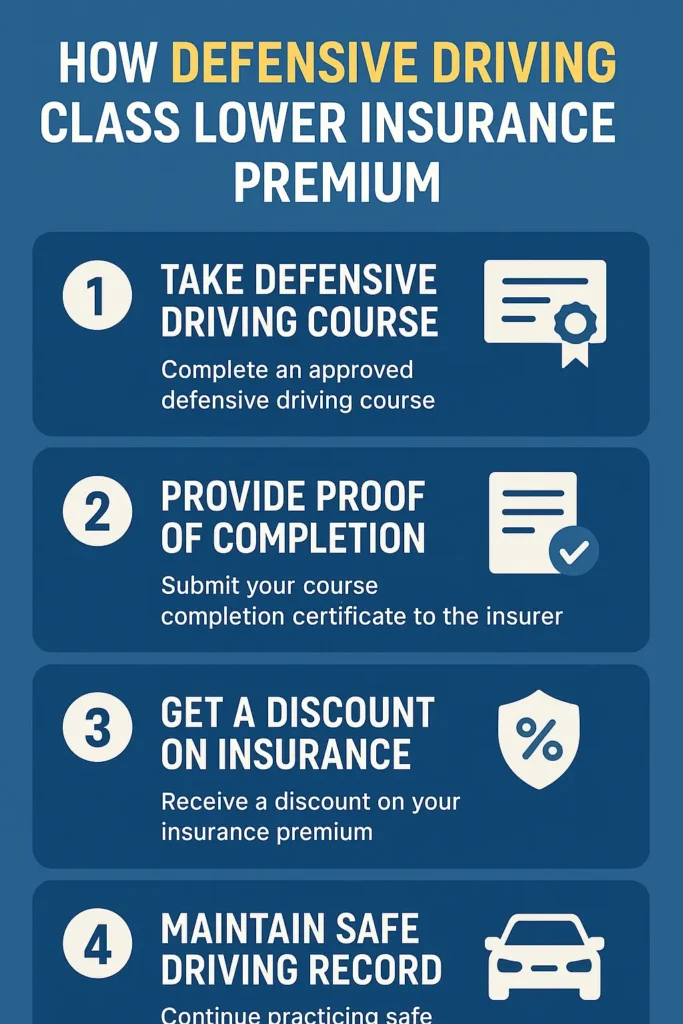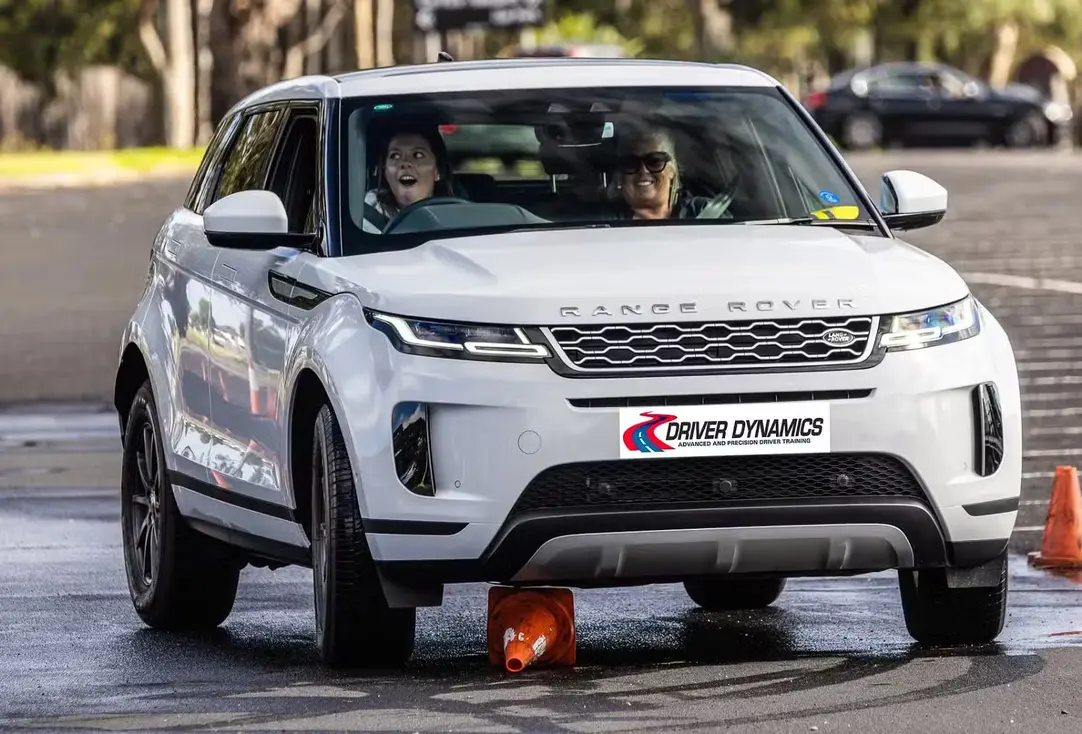Yes, a defensive driving class can lower insurance premiums. Many auto insurance providers offer discounts to drivers who complete a certified defensive driving course. The question “Does defensive driving class lower insurance?” is a common question among safety-conscious drivers, and the answer is rooted in both cost savings and proactive risk management. As a health and safety professional, I often advocate for these courses not only for their financial benefits but also for their role in reducing accident risks.
In this detailed guide, we will examine how defensive driving courses affect insurance costs, the benefits of taking one, and the factors insurance companies consider when offering discounts. We’ll also explore how this safety investment can help protect you, your family, and others on the road.
What Is a Defensive Driving Class?
A defensive driving class teaches drivers advanced techniques to avoid accidents, predict dangerous situations, and operate vehicles more safely. These classes go beyond basic driving skills and include modules on:
-
Hazard recognition
-
Safe following distances
-
Reaction time improvement
-
Road rage avoidance
-
Adverse weather conditions are driving
Read Also: Safety on the Road: Essential Tips for Staying Safe
The curriculum is designed to sharpen your decision-making skills and instill safe habits that contribute to overall road safety, a key concern in occupational and public health sectors.
How Defensive Driving Impacts Insurance Premiums

When addressing “Does defensive driving class lower insurance?”, it’s important to understand the insurance industry’s logic. Insurance companies reward behaviors that statistically lower risk. A driver who completes a defensive driving course is seen as:
-
Less likely to be in an accident
-
More likely to obey traffic laws
-
More responsible behind the wheel
Insurance discounts typically range from 5% to 20%, depending on your provider, state regulations, and the type of policy. The discount may apply to:
-
Liability coverage
-
Collision coverage
-
Comprehensive insurance
Why Do Insurance Companies Offer Discounts?
From a health and safety standpoint, fewer accidents mean fewer claims, which directly translates to cost savings for insurers. By encouraging drivers to take a defensive driving class, insurance companies aim to:
-
Reduce claim frequency and severity
-
Minimize property damage and personal injury costs
-
Promote long-term policyholder retention
The financial incentive is clear—if safer driving reduces insurer liability, they pass some of the savings onto you.
Who Is Eligible for a Defensive Driving Discount?
Insurance discounts for completing defensive driving classes are not universal. However, the following groups are often eligible:
-
Teen drivers: Statistically high-risk, so completing a course demonstrates maturity and responsibility
-
Senior drivers: Age-related changes in reaction time and vision can be mitigated with updated safety training
-
Drivers with recent tickets or accidents: In some cases, the court may mandate the course, but insurers may still offer a discount afterward
-
Commercial drivers: Employers often require defensive driving certification to reduce liability
Always check with your insurance provider to see if they recognize specific defensive driving programs for discounts.
Certified Courses vs. Non-Certified Courses
To qualify for an insurance discount, your defensive driving course must be certified by a recognized authority, such as:
-
State Department of Motor Vehicles (DMV)
-
National Safety Council (NSC)
-
American Safety Council
-
Online defensive driving providers accredited in your state
Completing a non-certified course may still improve your driving skills, but it won’t likely qualify you for an insurance discount.
How to Find a Defensive Driving Course Recognized by Insurance Companies
Insurance companies typically list the approved defensive driving courses on their websites. Alternatively, you can:
-
Contact your insurer directly and ask about eligible programs
-
Visit your state DMV website
-
Search for “state-approved defensive driving courses” online
-
Use national organizations like the National Safety Council or AAA
Online classes are becoming increasingly popular due to their convenience and flexibility—just ensure they are accepted in your state.
State-by-State Variations
Whether a defensive driving class lowers insurance also depends on where you live. Some states mandate discounts for defensive driving, while others leave it up to individual insurers.
Examples of State Regulations:
-
New York: Drivers who complete a DMV-approved defensive driving course receive a mandatory 10% discount on liability, PIP (Personal Injury Protection), and collision premiums for three years.
-
Texas: Insurance providers may offer discounts, but it’s not mandated.
-
California: Allows insurance discounts for seniors (55+) who complete approved safety courses.
Always verify your state’s rules before enrolling.
Defensive Driving Courses and Ticket Dismissal
In addition to lowering insurance, many defensive driving programs can also:
-
Help you dismiss a traffic ticket
-
Reduce points on your driving record
-
Avoid driver’s license suspension
Read Also: 11 Amazing Tips to Improve Driver Safety on the Road
While these legal benefits don’t directly affect insurance premiums, they improve your driving record, which can indirectly lead to lower premiums over time.
Does Defensive Driving Class Lower Insurance for Commercial Drivers?
Yes, and sometimes even more significantly. Commercial drivers, such as delivery personnel, truck drivers, and ride-share drivers, pose a higher liability to employers. Insurance providers often recommend or require defensive driving certifications to:
-
Lower commercial auto insurance rates
-
Demonstrate compliance with OSHA’s General Duty Clause
-
Reduce work-related motor vehicle injuries
Some companies even sponsor defensive driving classes for their employees to lower corporate insurance premiums.
How Long Does the Discount Last?
Typically, the insurance discount for completing a defensive driving course lasts three years, after which you may need to retake the course to maintain the discount. However, durations may vary by:
-
Insurance provider
-
State regulations
-
Type of driver (e.g., seniors may need more frequent renewals)
Mark your calendar to ensure continuous eligibility and ongoing savings.
Additional Benefits of Defensive Driving Courses
While the question “Does defensive driving class lower insurance?” focuses on cost, it’s worth exploring the broader health and safety benefits:
-
Reduced accident risk: Safe drivers are statistically less likely to be injured or cause injury to others.
-
Increased legal awareness: Understanding traffic laws can prevent fines and legal complications.
-
Mental preparedness: Defensive driving techniques improve reaction times and decision-making.
-
Lower stress: Confident, knowledgeable drivers often report less anxiety while driving.
Read Also: 10 Best Online Defensive Driving Courses Provider
These benefits align with public health goals to reduce injury rates, emergency response burdens, and economic loss due to traffic incidents.
Real-World Examples
To put this in perspective, here are two real-world examples:
Case 1: Young Driver in Florida
A 19-year-old driver completed a state-approved online defensive driving course. His insurer—GEICO—offered a 10% discount on his liability and collision coverage, saving about $180 annually.
Case 2: Senior in California
A 62-year-old woman took a defensive driving class through AAA. Her insurance company applied a 5% discount, and the course also helped her feel more confident handling her car in poor weather.
What to Ask Your Insurance Company
When inquiring whether a defensive driving class lowers insurance, ask these specific questions:
-
Do you offer a discount for defensive driving courses?
-
What courses are eligible for the discount?
-
How much can I save?
-
How long does the discount last?
-
Can I take the course online?
-
Can this also help with a traffic ticket?
Being proactive ensures you maximize both financial and safety benefits.
Final Thoughts
As a health and safety professional, I unequivocally recommend defensive driving courses. Whether you’re a new driver, a parent, a commuter, or a fleet manager, the benefits far outweigh the small investment of time and money.
So, to answer the question “Does defensive driving class lower insurance?” once more, yes, it often does. But beyond that, it lowers risk, improves safety, and demonstrates personal responsibility, which is invaluable.
A seasoned Health and Safety Consultant with over a decade of hands-on experience in Occupational Health and Safety, UBONG EDET brings unmatched expertise in health and safety management, hazard prevention, emergency response planning, and workplace risk control. With a strong passion for training and coaching, he has empowered professionals and organizations to build safer, more compliant work environments.
Certified in globally recognized programs including NEBOSH, ISO standards, and OSHA regulations, he combines technical know-how with practical strategies to drive health and safety excellence across industries. designing comprehensive HSE management systems or delivering impactful safety training, whether he] is committed to promoting a culture of safety and continuous improvement.
